In today's technology-driven world, hiring the right application developer can make or break your company's digital success. Many companies struggle with hiring due to not understanding the technical requirements or misjudging the cultural fit of potential candidates. It's crucial to recognize the demands of the role and the specific skill sets needed for developing robust and user-friendly applications.
This article will guide you through the hiring process, from understanding the core responsibilities of an application developer to identifying key skills and qualifications. We’ll also explore effective platforms for sourcing candidates, provide tips for resume screening, and suggest interview strategies. Find comprehensive insights in sections like skills tests that help in evaluating potential hires.
Table of contents
What Does an Application Developer Do?
An Application Developer creates, tests, and maintains software applications for computers, mobile devices, or web platforms. They work closely with clients or product managers to understand user needs and translate them into functional, user-friendly applications.
The day-to-day tasks of an Application Developer include:
- Writing clean, efficient code using various programming languages
- Debugging and fixing issues in existing applications
- Collaborating with design teams to implement user interface elements
- Integrating applications with databases and APIs
- Staying updated on new technologies and industry trends
- Participating in code reviews and documenting software specifications
Skills and Qualifications to Look for in an Application Developer
When hiring an application developer, defining the right candidate profile can be tricky. Many recruiters might get confused between what's truly required for the role and what's just nice to have. As every company has unique needs and tech stacks, it's important to make a clear distinction between the must-have and preferred skills for your team.
To effectively determine the required versus preferred qualifications, it can be helpful to align the candidate's skills with your team's technology stack and project requirements. Required skills often include a strong foundation in programming languages and software development methodologies. On the other hand, preferred qualifications might involve exposure to innovative technologies, such as cloud platforms or DevOps practices, which can be a great asset.
For a more structured hiring process, consider utilizing resources like online assessment platforms to objectively evaluate the technical skills of potential candidates.
| Required skills and qualifications | Preferred skills and qualifications |
|---|---|
| Bachelor's degree in Computer Science or related field | Experience with cloud platforms (e.g., AWS, Azure, Google Cloud) |
| Proficiency in at least one programming language (e.g., Java, Python, C#) | Knowledge of mobile app development (iOS or Android) |
| Experience with software development methodologies (e.g., Agile, Scrum) | Familiarity with DevOps practices and tools |
| Strong problem-solving and analytical skills | Understanding of UI/UX principles |
| Excellent communication and teamwork abilities | Contributions to open-source projects |
How to Write an Application Developer Job Description?
Crafting an application developer job description is the next step after defining the ideal candidate profile. A well-structured description will help you attract the right talent by clearly communicating expectations and opportunities.
- Outline Key Responsibilities: Clearly define the specific duties the application developer will undertake. This could include developing, testing, and maintaining software applications that align with your business goals. Highlight any particular frameworks or technologies relevant to your projects. For more details, refer to application developer job description.
- Balance Technical and Soft Skills: List the necessary technical skills such as proficiency in programming languages and familiarity with software development methodologies. Don't forget to mention soft skills like problem-solving, communication, and teamwork, which are equally important for application developers.
- Showcase Your Company's Unique Selling Points: Capture what makes your company an attractive place to work. This could include your innovative projects, opportunities for professional growth, or a collaborative working environment. Differentiating your organization from others can attract top candidates.
Top 10 Platforms to Hire Application Developers
Now that we have a detailed job description, the next step is to list it on popular job sites to attract potential application developers. Job portals are a great way to reach a large pool of candidates and efficiently source the right talent for your team.
Ideal for finding experienced application developers for full-time positions, leveraging professional networking and expansive reach.

Indeed
Useful for listing job descriptions for both full-time and part-time positions, with a large user base and easy-to-use search features.

Upwork
Great for hiring freelance developers on a project basis, providing access to a global pool of freelancers with varying skills.

The remaining platforms offer diverse options depending on your hiring goals. AngelList is perfect for startups seeking developers who thrive in innovative environments. Hired helps in discovering quality tech talent swiftly, especially for startups and full-time positions. Dice is tech-specific, making it ideal for finding IT professionals. GitHub Jobs connects you with a community engaged in open-source projects, while Remote OK is tailored for remote hires. Stack Overflow Jobs is highly effective for tech roles, connecting you with a vast network of developers. Additionally, employing online assessment platforms can streamline your recruitment process, ensuring you find candidates with the right skills.
How to Screen Application Developer Resumes
Resume screening is an important step to streamline your recruitment process and ensure you're considering the most suitable candidates. By filtering out resumes that don't match your criteria, you can save time and focus on candidates who have the potential to thrive in your organization.
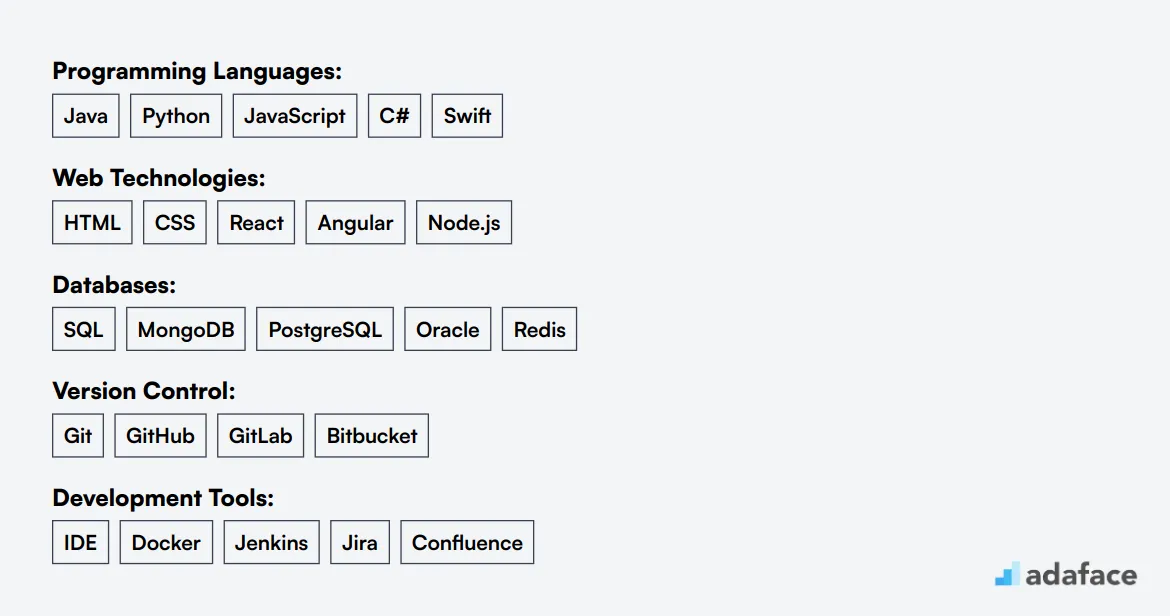
Understanding the right keywords is the first step in manual resume screening. When you review applications, look for must-have keywords like "Java," "Agile," or "GitHub" to ensure candidates have the necessary skills. Your goal is not to find the perfect resume immediately but to eliminate those that clearly lack the required qualifications and focus on potential fits.
Using AI language models can make your screening process even smoother. With tools like ChatGPT, you can automate resume filtering based on specific keywords. Simply input the keywords you need, and let the AI assist in highlighting relevant resumes.
Here's a sample AI prompt to help you screen resumes more effectively:
TASK: Screen resumes to match job description for application developer role
INPUT: Resumes
OUTPUT: For each resume, provide following information:
- Email id
- Name
- Matching keywords
- Score (out of 10 based on keywords matched)
- Recommendation (detailed recommendation of whether to shortlist this candidate or not)
- Shortlist (Yes, No or Maybe)
RULES:
- If you are unsure about a candidate's fit, put the candidate as Maybe instead of No
- Keep recommendation crisp and to the point.
KEYWORDS DATA:
- Programming Languages (Java, Python, C#)
- Web Technologies (React, Angular, Node.js)
- Databases (SQL, MongoDB)
Recommended skills tests for Application Developers
Skills tests are an effective way to evaluate Application Developers beyond their resumes. They provide objective insights into a candidate's technical abilities and problem-solving skills. Here are five key tests we recommend for assessing Application Developers:
Full Stack Developer Test: This comprehensive assessment evaluates a candidate's proficiency in both front-end and back-end development. It covers various technologies and frameworks commonly used in full-stack development.
JavaScript Online Test: JavaScript is a core language for web development. This test assesses a candidate's knowledge of JavaScript fundamentals, ES6+ features, and common libraries or frameworks.
Python Online Test: Python is widely used in web development, especially for back-end services. The Python skills test evaluates a candidate's ability to write efficient Python code and use its libraries effectively.
React Native Online Test: For mobile app development, the React Native test is valuable. It assesses a candidate's ability to create cross-platform mobile applications using React Native framework.
Technical Aptitude Test: Beyond specific programming languages, a technical aptitude test evaluates a candidate's problem-solving skills, logical reasoning, and ability to understand complex technical concepts. This test helps gauge a developer's overall technical acumen.
Recommended Case Study Assignments to Hire Application Developers
Case study assignments can be a valuable tool in hiring application developers. They provide insight into a candidate's problem-solving skills and creativity. However, these assignments can also be time-consuming, potentially leading to lower completion rates and missed opportunities with strong candidates. Let's explore a few case studies that balance effectiveness and manageability.
Build a Simple Responsive Web Application: This assignment involves creating a basic web application with responsive design. It's a great way to evaluate a candidate's understanding of front-end technologies and user experience principles. Consider using relevant front-end developer interview questions to complement this assignment.
Develop a RESTful API: Candidates are asked to design and implement a RESTful API for a given scenario. This case study tests their back-end skills, including database interactions and API security measures. Reviewing back-end developer interview questions can further enhance your assessment.
Mobile App Development Task: Assigning the creation of a basic mobile application helps gauge a candidate's proficiency in mobile technologies. This is particularly effective for roles requiring Android or iOS skills. You might want to refer to the mobile developer job description for additional context.
How to Structure the Interview Stage for Hiring Application Developers
Once candidates successfully pass the skills tests, it's time to move them forward to technical interviews. This step is crucial for evaluating not just their technical prowess, but how they apply their knowledge in real-world scenarios. Skills tests are excellent for filtering out unfit candidates, but technical interviews help you identify the best candidates suited for the role.
Here are some recommended interview questions to ask application developers:
- Describe a challenging project you worked on and how you approached it. This question helps assess problem-solving abilities.
- Explain a situation where you had to learn a new technology quickly. This looks at adaptability.
- How do you ensure the quality and security of your code? This focuses on best practices and attention to detail.
- Can you discuss a time when you needed to collaborate with designers or other developers? This is about teamwork skills.
- What do you consider when optimizing an application? Skills required for application developer can guide this question.
How much does it cost to hire an Application Developer?
The cost of hiring an application developer varies based on location and experience level. In the United States, salaries range from $60,670 to $146,633, with an average of $100,079. In India, developers earn between ₹413,961 and ₹1,577,263, averaging around ₹925,928. Meanwhile, in Australia, salaries span from AUD 75,123 to AUD 143,156, with a median of AUD 103,703.
Application Developer Salary United States
In the United States, the salary for an Application Developer varies depending on location and experience. The average salary is approximately $100,079. Developers in Santa Clara, CA can earn between $90,829 and $210,192, while those in Philadelphia, PA might see salaries ranging from $63,118 to $115,343. Nationally, a developer's salary generally falls between $60,670 and $146,633.
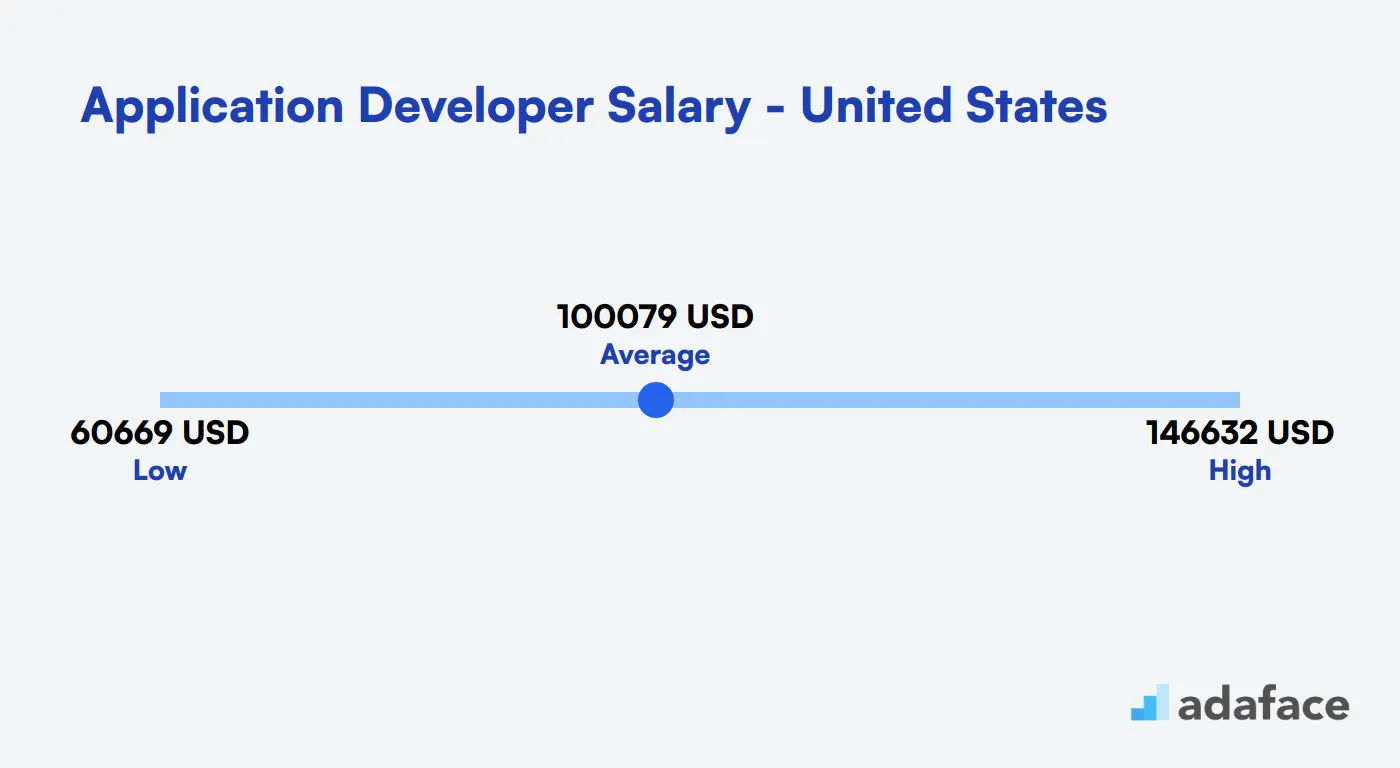
Application Developer Salary in the United Kingdom
The average salary for an Application Developer in the United Kingdom is approximately £45,000 per year. Entry-level positions typically start around £30,000, while experienced developers can earn upwards of £70,000. Salaries can vary significantly based on factors such as location, industry, and specific skill sets.
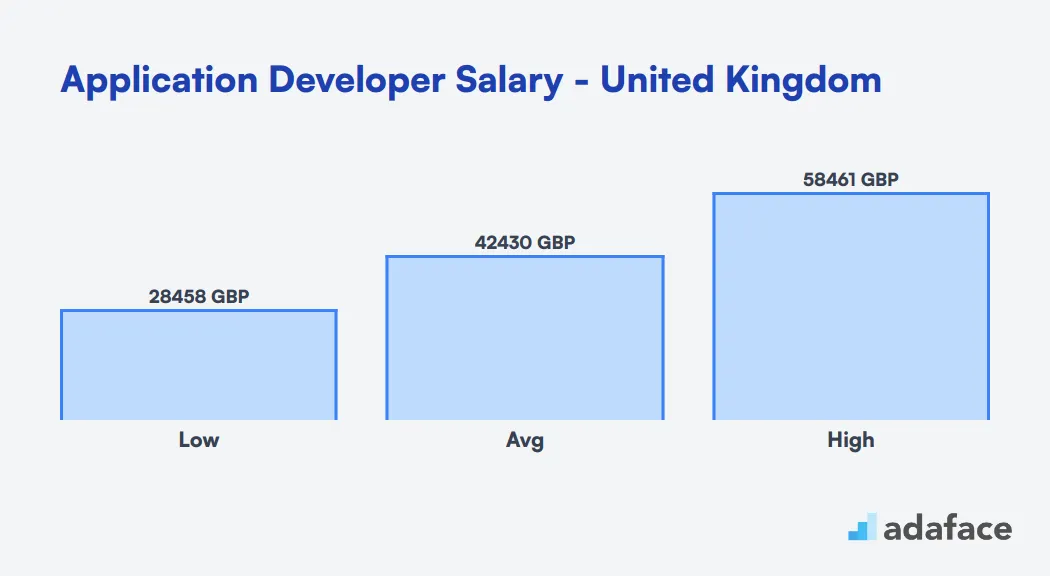
Application Developer Salary Australia
In Australia, an application developer can expect to earn a median salary of AUD 103,703. Salaries typically range from AUD 75,123 to AUD 143,156, depending on factors such as location and experience. Canberra ACT leads with some of the highest salaries, while Melbourne and Sydney also offer competitive pay within this range.
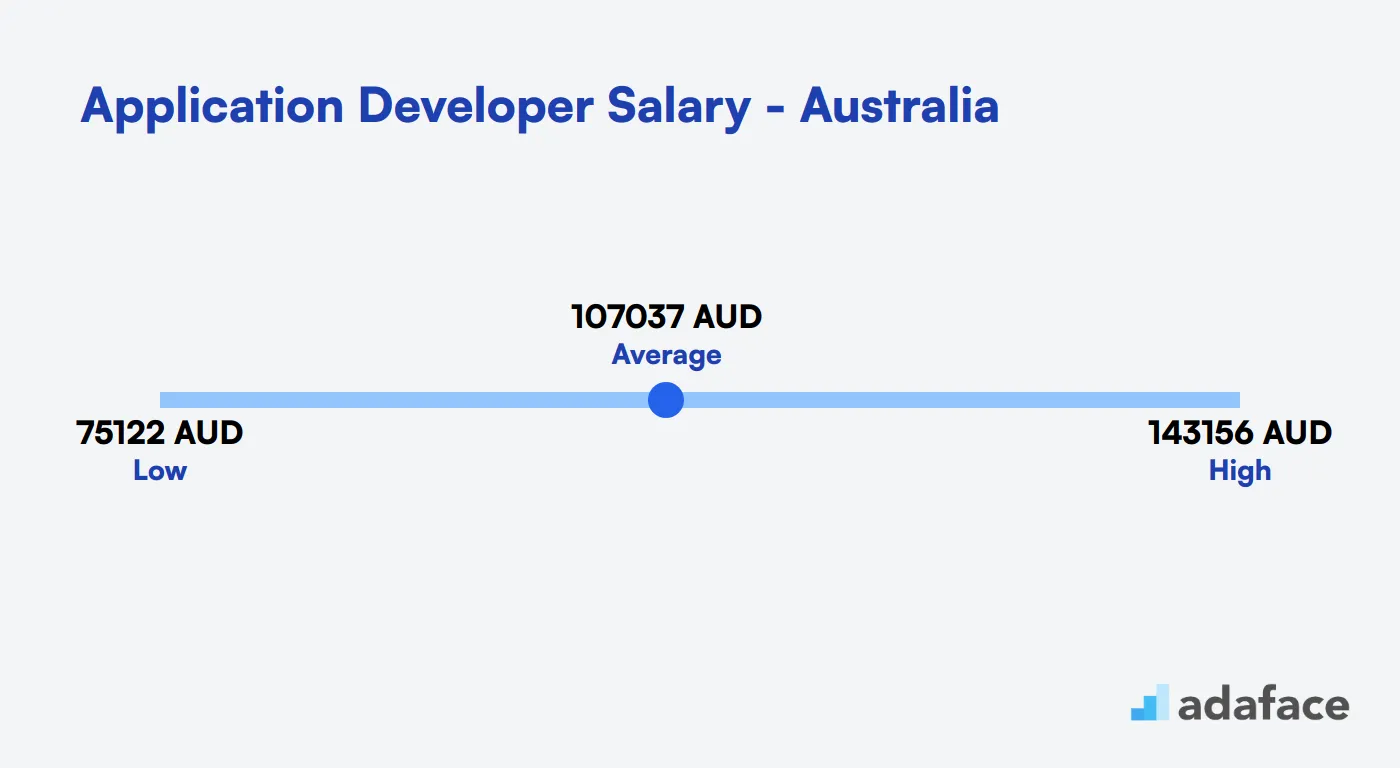
Application Developer Salary in India
The average salary for an Application Developer in India is approximately ₹925,928 per year. Salaries can range from a minimum of ₹413,961 to a maximum of ₹1,577,263, depending on factors such as location and experience level.
Major cities like Bengaluru and Hyderabad typically offer the highest salary ranges, with averages around ₹1,002,145 and ₹1,103,204 respectively. In contrast, cities like Kolkata and Vadodara have lower average salaries, starting from about ₹511,536.
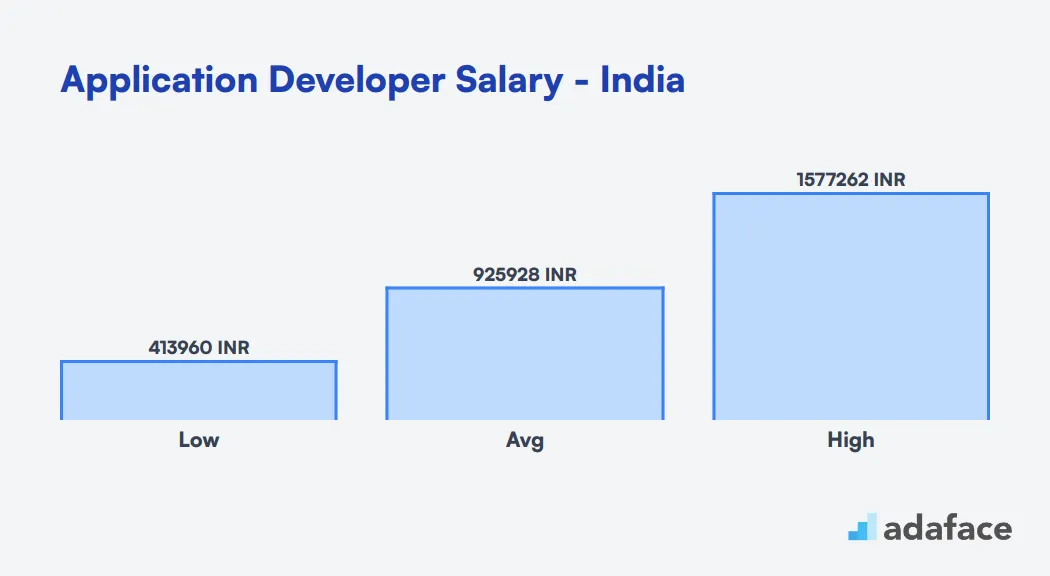
What's the difference between a Frontend Developer and a Backend Developer?
Many people often confuse frontend developers and backend developers, primarily because both roles are essential in creating a functional application. While they collaborate closely, their responsibilities and skill sets differ significantly.
A Frontend Developer focuses on the user interface and user experience of a website or application. They mainly work with languages like HTML, CSS, and JavaScript, utilizing frameworks such as React, Angular, or Vue to create visually appealing layouts. Their role involves direct interaction with users, ensuring that the site is not only attractive but also easy to navigate.
In contrast, a Backend Developer deals with server-side logic and database interactions. They use languages like Java, Python, or Ruby, and frameworks such as Node.js, Django, or Spring to build the behind-the-scenes functionalities. Their expertise lies in managing data handling efficiency and ensuring seamless integration with the frontend.
To summarize the key differences:
- Primary Focus: User Interface (Frontend) vs. Server-side Logic (Backend)
- Languages: HTML, CSS, JavaScript (Frontend) vs. Java, Python, Ruby (Backend)
- Frameworks: React, Angular, Vue (Frontend) vs. Node.js, Django, Spring (Backend)
- Role in Development: Design and aesthetics (Frontend) vs. Logic and integration (Backend)
- User Interaction: Directly visible (Frontend) vs. Not visible (Backend)
| Frontend Developer | Backend Developer | |
|---|---|---|
| Primary Focus | User Interface | Server-side Logic |
| Languages | HTML, CSS, JavaScript | Java, Python, Ruby |
| Frameworks | React, Angular, Vue | Node.js, Django, Spring |
| Tools | Chrome DevTools, Figma | Docker, Kubernetes |
| Role in Development | Design and aesthetics | Logic and integration |
| User Interaction | Directly visible | Not visible |
| Database Knowledge | Basic understanding | In-depth knowledge |
| Performance Focus | Loading speed, UX | Data handling efficiency |
Hire the Best Application Developers
We've covered the key aspects of hiring application developers, from understanding their role to crafting job descriptions, screening resumes, and conducting interviews. The process can be complex, but focusing on these elements helps identify top talent for your team.
If there's one takeaway, it's the importance of using well-crafted job descriptions and skills tests to make hiring more accurate. These tools help you assess candidates objectively and ensure they have the technical skills needed for the job. Remember, the right hire can significantly impact your project's success, so take the time to find the best fit for your team.
Full Stack Developer Test
FAQs
An application developer designs, builds, and maintains software applications. They work on understanding user needs, defining system functionality, and writing code in various programming languages.
Look for proficiency in programming languages relevant to your project, problem-solving skills, attention to detail, and experience with software development methodologies like Agile or Scrum.
An effective job description should clearly outline the role's responsibilities, required skills, and qualifications. Make sure to include information about your company culture and the specific technologies used in your projects.
You can find talented application developers on platforms like LinkedIn, GitHub, Stack Overflow, and specialized job boards. Consider networking with industry professionals at tech conferences and meetups as well.
Focus on relevant technical skills, experience in similar projects, and any certifications or technical assessments like those provided by Adaface coding tests.
Ask questions that assess technical expertise, problem-solving abilities, and cultural fit. Tailor questions to your projects and check resources like this list for inspiration.
During interviews, discuss your company's values and work culture. Include behavioral questions to gauge how candidates align with your team's dynamics and company ethos.

40 min skill tests.
No trick questions.
Accurate shortlisting.
We make it easy for you to find the best candidates in your pipeline with a 40 min skills test.
Try for freeRelated posts
Free resources



